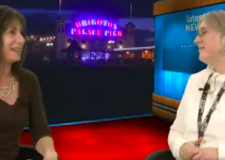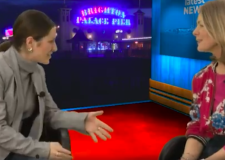Science: Unlocking Potential
Dr Caroline Oprandi keeping you up to date with science & technology at PACA
So we are back from our prize winning trip to CERN in Switzerland and I have to say it really was an amazing experience. The highlight for me had to be meeting the Engineers during the Health and Safety training. It is one thing to be theoretical physicists but then something else to actually put the theory into practice and build something like CERN. I am biased though, since my father was a Chartered Electrical Engineer. 
We couldn’t actually go down into the CERN tunnel since we would’ve been completely fried. They were doing live experiments whilst we were there and we were watching from the ATLAS control room. University of Sussex Researchers kindly came to meet us and gave us a talk and also came to lunch with us.
We then went to the AMS experiment control room where there was a live link with the International Space Station. The highlight for the students had to be making their own particle detectors – cloud chambers – at the S’Cool lab. It really was a fun way to end the two day visit and Alex our teacher tweeted, “well that was fun with PACA! I do love my job”. Alex’s favourite question was “what happens if we shine the light through the blue glove into the cloud chamber”. Nothing, as it happens but even so, children’s playful imagination mustn’t be lost when conducting cutting edge science.
Another highlight for me whilst at CERN was to stand at the spot where the British Scientist Tim Berners- Lee invented the world wide web (WWW) in 1989. The web was originally conceived and developed to meet the demand for automatic information-sharing between scientists in universities and institutes around the world.
However, 200 years ago on 10th December 1815, Ada Lovelace was born and she is considered to be the first computer programmer after writing the first algorithm. Ada was the daughter of Lord Byron and as well as being a great mathematician, she also had a fantastic imagination. Ada developed a vision for the capability of computers to go beyond mere calculating or number crunching. She examined how individuals and society could relate to technology as a collaborative tool.
Portslade Aldridge Community Academy (PACA) is a college offering sixth form, 11-16 years, youth centre, adult learning, community education, sports centre and pre-school. Find out more at www.paca.uk.com





















